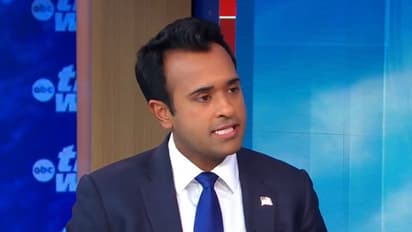'Why are Hindus always soft targets': Vivek Ramaswamy's response sparks debate

Synopsis
Vivek Ramaswamy's calm response to a citizen calling Hinduism 'evil' in the US has sparked a debate on tolerance within Hinduism and questioned the potential repercussions of such remarks towards other religions.
A recent debate between Republican candidate Vivek Ramaswamy and a U.S. citizen, in which the latter called Hinduism an "evil, idolatrous religion," has garnered attention.
Ramaswamy's measured response, even to such provocative statements, has highlighted the inherent tolerance and resilience within Hinduism. The incident has raised questions about the potential repercussions if similar comments were directed at other religions.
Evangelical Groups in the US Have a History of Denouncing Hinduism
Certain evangelical groups in the US have a long-standing tendency to denounce non-Abrahamic religions, particularly Hinduism, labelling them as "idolatrous" and incompatible with American values. Hindus, both in India and abroad, have rarely reacted with the same level of outrage as often seen when Christianity or Islam are similarly targeted.
This situation underscores the deep-rooted tolerance embedded within Hindu philosophy. Instead of escalating the debate or seeking legal remedies, Ramaswamy calmly defended his faith.
Such Remarks Against Christianity in India Would Cause Uproar
The video of the debate has gone viral on social media, with the US citizen facing criticism for his remarks against Hinduism. Critics have pointed out that if such a public denouncement of Christianity were made in India, the reaction would likely be far more intense. Accusations of "Hindutva" promoting religious intolerance would be widespread in Indian media, and international media would be eager to portray India as intolerant. Public interest litigations would be filed.
This reveals how quickly Christian groups can mobilize when their faith is targeted. There's a stark difference in how religious tolerance is perceived and practised across different societies. Hinduism, with its pluralistic ethos and deep-seated belief in "Sarva Dharma Sambhava" (respect for all religions), generally accepts criticism.
This contrasts sharply with the West, where criticism or mockery of Christianity often faces legal action and public outcry. The real question then becomes: who is truly tolerant in today's world? The incident with Ramaswamy serves as a reminder that Hinduism, despite facing targeted attacks, remains a beacon of religious tolerance in an increasingly polarized world driven by identity politics.
Check the Breaking News Today and Latest News from across India and around the world. Stay updated with the latest World News and global developments from politics to economy and current affairs. Get in-depth coverage of China News, Europe News, Pakistan News, and South Asia News, along with top headlines from the UK and US. Follow expert analysis, international trends, and breaking updates from around the globe. Download the Asianet News Official App from the Android Play Store and iPhone App Store for accurate and timely news updates anytime, anywhere.